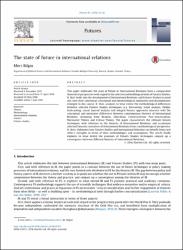The state of future in international relations
Künye
Bilgin, M. (2016). The state of future in international relations. Futures, 82, 52-62. https://dx.doi.org/10.1016/j.futures.2016.05.011Özet
This paper elaborates the state of Future in International Relations from a comparative theoretical perspective with regard to the selected methodological tools of Futures Studies. It, first, looks into the development of International Relations and Futures Studies to point out, how their contextual, conceptual and epistemological similarities and dissimilarities emerged in due course. It, then, analyses to what extent the methodological differences between selected Futures Studies techniques (e.g. forecasting, trend analysis, Delphi, backcasting, causal layered analysis and integral futures approach) intersect with the conceptual and normative differences between contemporary theories of International Relations stemming from Realism, Liberalism, Constructivism, Post-structuralism, Normative Theory and Critical Theory. The paper characterizes the relevant futures techniques with reference to the theories of International Relations, and scrutinizes selected futuristic narratives of International Relations from a methodological perspective. It, then, elaborates how Futures Studies and International Relations can benefit from each other's strengths in terms of their methodologies and assumptions. The article finally explores to what extent the promises of Futures Studies techniques conjure up a convergence between different theories of International Relations.


















